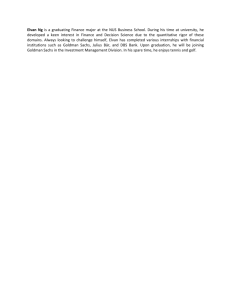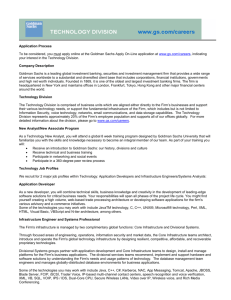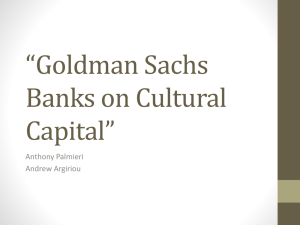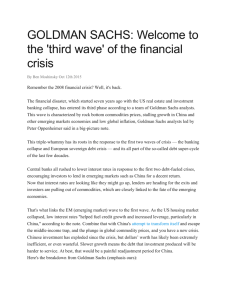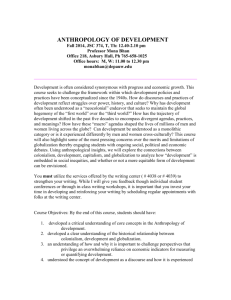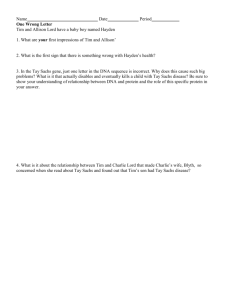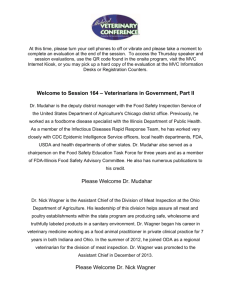Wagner`s Die Meistersinger von Nürnberg
advertisement
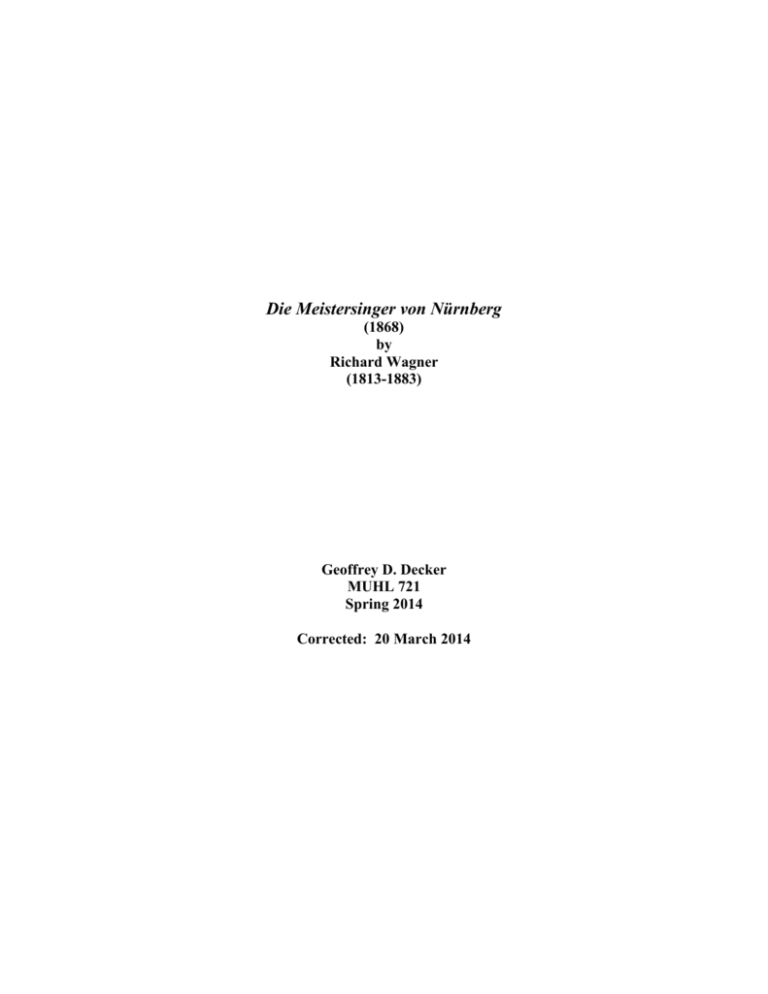
Die Meistersinger von Nürnberg (1868) by Richard Wagner (1813-1883) Geoffrey D. Decker MUHL 721 Spring 2014 Corrected: 20 March 2014 Richard Wagner: Die Meistersinger von Nürnberg (1868) German composer Richard Wagner's (1813-1883) comedy, Die Meistersinger von Nürnberg, or The Mastersingers of Nuremberg, premiered at the Königliches Hof- und NationalTheater in Munich on 21 June 1868 under the direction of the famed conductor Hans von Bülow. Most musicologists consider it Wagner's only comedy even though it is actually his second; Wagner himself rejected his first comic opera, Das Liebesverbot, or The Ban on Love. Compositional History Wagner's first thoughts of writing an opera about Nuremberg's most famous medieval citizen, the cobbler-singer-poet Hans Sachs and the guild of mastersingers to which he belonged were in 1845. After composing Tannhäuser, about a singing competition that ends in tragedy, he found it amusing to follow up with an opera about a comic one. This was not an original idea of Wagner's but rather one based on the ancient Greek tradition of following a tragedy with a comic satire.1 On his first vacation since completing Tannhäuser, Wagner and his wife, Minna, checked into the Pension zum Kleeblatt in the spa town of Marienbad, now in the Czech Republic. Among the books he took along were Georg Gervinus' history of German literature and translations of Wolfram von Eschenbach's epic poems Parzival and Titurel and the anonymous Lohengrin epic. Even though the doctors advised him to not exert himself physically or mentally, this reading material only served to feed his creative unease, thus counteracting any beneficial effects of the baths and relaxing atmosphere. In avoiding the emotional stresses of the Lohengrin tragedy, he did not relax as ordered but rather mapped out the plot of a story recounted in Gervinus' history of Hans Sachs and the Marker. His lengthy prose sketch for all three acts of Die Meistersinger was written without interruption and, when completed, was put away and he returned to the baths.2 After second and third drafts incorporating more of the story of sixteenth-century Nuremberg, the mastersingers and Hans Sachs in 1861, Wagner completed the poem of Die Meistersinger on 25 January 1862 and began composition in March or April of that same year. He completed the full score in October 1867.3 Synopsis of the Opera Act One Walther von Stolzing, a young nobleman and guest of the goldsmith Veit Pogner, is visiting Nuremberg to sell land and finds himself enamored with the beautiful Eva Pogner, his host's daughter, during mass at St. Katharine's Church. After the service, Walther approaches Eva and her maid, Magdalene, and discovers that she is promised to the winner of a song contest 1 James H. Sutcliffe, "The Making of the Masters" (Liner notes for CD of Wagner's Die Meistersinger von Nürnberg. EMI 5551522, 1994), 10. 2 Martin Gregor-Dellin, Richard Wagner: His Life, His Work, His Century (New York: Harcourt Brace Jovanovich, Inc., 1983), 141-142. 3 Barry Millington, "Die Meistersinger von Nürnberg," The New Grove Dictionary of Opera, Vol. 3. Ed. Stanley Sadie (London: Macmillan Reference Limited, 1997), 313. 1 to be held by the Mastersingers' Guild at the following day's festivities for Johannistag, or St. John the Baptist Day. Soon, the maid's love interest, the young apprentice to the guild, David, enters. Believing that the only way that Walther will ever win Eva's hand is to enter the song contest, she charges David to teach Walther the ways of the Mastersingers. David and Walther begin while awaiting the guild's arrival for a meeting in the church. Realizing that Walther has about as much knowledge of composing and singing songs as he himself, David tells Walther that the fastest way to become a Mastersinger is to write an original poem and set it to an original melody. Walther decides to give it a try just as the Mastersingers begin to arrive. One of the most respected members of the guild, the aforementioned Veit Pogner, is a goldsmith who lately agreed to support another member, Sixtus Beckmesser, the older, nevermarried and brutish town clerk, in his effort to win Eva's hand. Walther soon tells Pogner of his desire to join the guild. Pogner subsequently introduces his guest to the other Mastersingers. The last to arrive is the cobbler Hans Sachs and, after another member calls roll, Pogner proudly announces that the contest's victor wins Eva's hand in marriage. At first excited, the Mastersingers soon voice concern over their loss of absolute authority in determining the winner when Pogner tells them that she can refuse the winner's hand if not satisfied. Sachs tempers their disappointment by suggesting that they allow the people of Nuremberg to voice their judgment too. The Mastersingers then give Walther his chance to join the guild and Beckmesser, already seeing him as a rival for Eva's hand, takes his place in the so-called marker's box behind a curtain with his ledger at the ready to record all of Walther's mistakes. Walther begins timidly and soon, with thoughts of Eva, sings an inspired song about nature, spring and love. In spite of Beckmesser's finding fault in every syllable and note, the song impresses Sachs who criticizes Beckmesser for his lack of impartiality in judging. In spite of Walther's failure, the act ends with both Pogner and Sachs impressed with the young knight's courage and sincerity. Act Two Later that day, Pogner perceives Eva's interest in their young guest. Eva learns from Magdalene that Walther failed acceptance to the guild. She decides to speak to Sachs later to learn details of the song trial. Sachs, knowing that his apprentice, David, is in a defeated state of mind, sends him to bed and, before getting down to finish a pair of new shoes for Beckmesser, begins to muse on the elder-blossom from the tree outside his shop. He realizes that his positive feelings are in response to Walther's song earlier that day. Finding Sachs back at work, Eva pries him for information about the day's song trial. He tells her of Walther's failure to win admission to the guild and, seeing her concern at mention of this, realizes that she is in love with Walther. As he resolves to do all he can to help Walther win the competition, Eva hears Magdalene calling and heads home with her; along the way, Magdalene tells her that Beckmesser plans to serenade her that night. Eva convinces the maid to stand in for her at the window and, just as they reach home, Walther appears. He tells her of his failure and, in his frustration, he derides the Mastersingers. As Magdalene pulls Eva inside, Walther hides behind a tree. Sachs knows that the young pair might be planning to elope so opens the door to his nearby shop so that he can keep an eye on things. As soon as he sees Eva sneaking out of the house in Magdalene's clothing, though, he 2 floods the area with light from his lamp, thus foiling their plans. Eva and Walther hide behind a tree just as Beckmesser arrives with lute in hand to begin the serenade. Sachs, in an effort to spoil the serenade and, at the same time, warn Eva not to elope, sings a rather obnoxious cobbler's song while hammering away as he works on a pair of shoes for Beckmesser. In his desperate effort to find peace enough to serenade Eva, Beckmesser tells Sachs that he may mark his mistakes with his hammer blows. Beckmesser's singing gets louder and louder and, the shoes finished, Sachs, mocking Beckmesser's behavior that afternoon during the song trial, calls out asking if Beckmesser is finished yet. Soon lights come on in the windows above; people begin poking their heads out of doors and windows and a crowd gathers. Before long, a riot breaks out with Beckmesser in the middle and, before the frustrated young Walther hurts someone with his drawn sword, Sachs pulls him and Eva inside. The night watchman's horn is heard and everyone immediately disperses just as the watchman turns the corner to find the scene strangely -- and comically -- silent. Act Three The next morning Sachs is sitting and contemplating the night before when David enters. Sachs has him practice his song which has a connection to Johannistag, and, being a sort of name day for Hans Sachs, David offers his master some treats from a basket given him by Magdalene. Touched by the offering, Sachs sends him to get ready for the day's festival. Sachs believes himself responsible for the previous night's bad behavior of his fellow Nurembergers and, in an extended monologue, known as the Fliedermonolog, he seeks to blame what happened on anything but human behavior. He soon realizes that it is a new morning, it is Johannistag and some good may come from the madness. Walther soon shows up and Sachs encourages him to create a perfect Mastersong for the contest. Having had a beautiful dream the previous night, Walther sings a song of several verses using his dream as inspiration and Sachs writes it down, leaving the third and final verse for later. The two exit to prepare for the contest. Suddenly Beckmesser, in obvious pain from the previous night's ruckus, appears at Sachs' workshop and, seeing the unfinished song sitting in view, believes Sachs is going to compete against him for Eva's hand. When Sachs returns, he gives the song as a present to Beckmesser who, now confident that Sachs is not entering the contest, promises to make the best out of it and he leaves to practice. Eva arrives to have a shoe stretched -- one that, metaphorically, pinches -- and, while Sachs works on it, Walther appears in full regalia and, seeing Eva in her full splendor in bridal dress, he sings the third and final verse of his song. Eva falls on Sachs' breast and, as tears flow, she tells the older man how much she owes him and, if it were not for the situation, she would gladly marry him. He tells her that he knows the sad tale of Tristan und Isolde and emphasizes that he would not play the part of King Mark to Walther's and Eva's Tristan and Isolde. Soon David and Magdalene arrive and Sachs tells them that David is promoted to journeyman and, in jest, tells them that they arrived just in time to see 'a child' baptised, the "child" being Walther's new song. The next scene takes place on a large meadow beside the river Pegnitz where the St. John the Baptist Day festivities and the song competition begin with a gathering of all of the citizens of Nuremberg; the various guilds, maidens from other towns, apprentices and, finally, the 3 Mastersingers. The populace hails Hans Sachs' arrival and, in turn, he asks the people to pay homage to the contest and its prize. Beckmesser performs first and his ridiculous and poorly memorized rendering of Walther's song, set to his own melody, causes everyone to break out in hysterical laughter. He rushes from the scene blaming his failure on Sachs who he says was the author. Next, Sachs accepts credit for the words and introduces Walther who then performs and, even though he breaks the rules, the Mastersingers are swept away by his delivery and integrity and they, by general consent, award him the prize. But, when Pogner offers him a Master's chain, Walther refuses it, remembering their offensive behavior at his try-out. Sachs persuades him to accept it, though. Sachs then praises German art that has survived a long and troubled history. He celebrates the sovereignty of the German spirit and his belief that, as long as "holy" German art is respected, that sovereignty will never die. General Overview Unlike Wagner's other operas, the plot in Die Meistersinger von Nürnberg involves only humans and their very human emotions; there is no supernatural. As Abbate and Parker say, "It was an anomaly in his oeuvre."4 Although it is not as funny as a Rossini comedy, there is indeed comedy and, at a much dryer level, some slapstick. One only needs to see a good production of the opera to know that Beckmesser's beating in the riot scene ending Act Two can be very slapstick in nature. More than any other of his operas except for Parsifal (1882), Wagner clearly and musically distinguishes characters, or groups of characters, by rhythm and orchestral colors. He also does it by melodic and harmonic traits. One can sometimes find arias or monologues spread throughout and there is even a quintet in Act Three but otherwise, the work is durchkomponiert in the style of his mature operas like Tristan und Isolde and Der Ring des Nibelungen. Wagner very successfully depicts Renaissance Germany, the era of the Mastersingers, with foursquare rhythms, fanfare-like melodies, and diatonic harmony. He even depicts the apprentices with unmistakable dance and leaping rhythms.5 We feel from the very moment the orchestra begins with the magisterial and bright C major chord of the Prelude to Act One that we are in the center of the old walled city. As an aside, this prelude is often performed in concert and gives "a complete musical epitome of the story."6 Although the work is still regularly performed, critics reject it with suspicion because of its obviously pro-German text and its dark and seemingly anti-Semitic underside. It can be argued that anti-Semitism is woven into the ideological fabric of the work and that the representation of Beckmesser carries, at the very least, overtones of anti-Semitic sentiment.7 Still, Die Meistersinger is a glorious affirmation of humanity and the value of art of every culture. Hans Sachs speaks of honoring the German masters but, in reality, he reaches out to all 4 Carolyn Abbate and Roger Parker, "A History of Opera" (New York: W. W. Norton & Sons, 2012), 342. Martin Cooper, "The Human Comedy in Renaissance Germany" (Liner notes for CD of Wagner's Die Meistersinger von Nürnberg. Deutsche Grammophon 415 278-2, 1976), 22. 6 Earl of Harewood and Antony Peattie, The New Kobbé's Opera Book (New York: G. P. Putnam's Sons, 1997), 936. 7 Barry Millington, 313. 5 4 of us to honor the art of each of our cultures, to never forget or hide it away but rather to celebrate it and its creators. In spite of the criticisms mounted against the opera, admired humanitarian musicians like the conductor Arturo Toscanini and pianist-patriot Ignaz Jan Paderewski sang the praises of the opera, Jewish-born conductors Daniel Barenboim and James Levine are strong exponents of the work and H. L. Mencken declared, " I believe that Die Meistersinger is the greatest single work of art ever produced by man. It took more skill to plan and write it than it took to plan and write the whole canon of Shakespeare."8 Act Three Scene Five As the quintet "Selig, wie die Sonne" ("Blessed, as the sun") between Sachs, Eva, Walther, David, and Magdalene ends, distant heralding trumpets transition to the opera's final scene. Traditional productions transport the audience to a highly decorated festival area in an open meadow on the banks of the river Pegnitz that runs through the center of Nuremberg. The Johannistag celebrations and song contest thus begin. Festive banners ring the area and, as everyone gathers, the citizens, various guilds, and guests from other towns carry in more banners. Everyone is dressed in festive traditional garb and, before long, it seems there are hundreds, if not thousands, of people on stage. Chorus: "Sankt Krispin, lobet ihn!" ("Saint Crispin, praise him!") The cobblers guild enters and praise Saint Crispin who was also a cobbler. As they finish entering, the music alternates between festive music with drums and trumpets and a light toy-trumpet sound that gives way to a second chorus. Chorus: "Als Nürnberg belagert war" ("When Nuremberg was besieged") The tailors guild enters telling of a tailor that sewed himself into a goat's suit and danced on the walls of the city, successfully scaring away the besiegers. Chorus: "Hungersnot! Hungersnot!" ("Famine! Famine!") The major key chorus of the tailors is suddenly interrupted by the much more serious and minor key chorus of the bakers singing of the importance of getting bread each day to keep hunger away. At this point, the music takes on a much lighter orchestration. Waltz: The apprentices enter dancing to a light 3/4-time waltz. (Concert orchestras sometimes perform this music without the vocal line under the title "Dance of the Apprentices.") They are happy to see a boatload of colorfully-dressed young maidens disembarking from a nearby town, Fürth. David asks them "What will the Masters say?!" The apprentices taunt David about Magdalene who he sees in the crowd. The apprentices soon notice the Mastersingers gathering in a formation to make their way to the rostrum from which they will judge the contest. They march in to the festive music of the Prelude to Act One. Chorus: "Silentium! Silentium!" ("Silence! Silence!") The crowd asks for silence and, as Hans Sachs, rises to speak, the crowd sings, "Wach auf, es nahet gen den Tag!" ("Awake! Now the dawn of day is seen!") These are the words with which the historical Sachs greeted Luther and the Reformation.9 With the music at the words "Wach auf" the clouds seem to open and sunlight bathes the crowd in brightness. 8 M. Owen Lee, Wagner and the Wonder of Art: An Introduction to Die Meistersinger (Toronto: University of Toronto Press, 2007), 7. 9 Barry Millington, 316. 5 Aria: "Euch macht ihr's leicht..." ("You take it lightly...") Sachs, overcome with emotion and the crowd's homage to him, exhorts them to pay honor not to him but rather to the seriousness of the contest, its winner and to the art of the Masters. A discussion ensues and Beckmesser is led to the podium to sing his song. Aria: "Morgen ich leuchte in rosigem Schein" ("In the morning I shine in a rosy light") Beckmesser, after much struggle to memorize the lyrics, sings the song given him by Sachs which is actually Walther's song. Singing the words to his own tune heard earlier as his "Serenade," Beckmesser renders the song with what Millington says are "grotesque misaccentuations and violations of metre" and his garbling of the words produce "an absurd, tasteless parody of the original."10 This provokes a great deal of hilarity in the audience and Beckmesser, frustrated and humiliated, runs from the podium denouncing Sachs as the author. Sachs accepts the credit and then introduces Walther who he says will make sense of the words. Aria: "Morgenlich leuchtend in rosigem Schein" ("Shining in the rosy light of morning") Walther sings his song which is now, as Millington says, "compressed into a single Bar-form of three stanzas (A-A-B) but with each stanza expanded."11 In several of the details of his singing, including a beautiful downward transition from the tonic C major to B-flat, he breaks several rules of the Masters. He sings with such conviction and honesty that he sways the Masters who award him the prize by general consent. Aria: "Verachtet mir die Meister nicht" ("Scorn not the masters") Hans Sachs explains how the Masters have cultivated and preserved their "holy art" through all of the terrible history of Germany and he concludes celebrating German art and the sovereignty of the German spirit. Chorus: "Ehrt eure deutschen Meister" ("Honor your German masters") The chorus ends the opera repeating a phrase from Sachs' aria. Note that this phrase is the one that most offends critics. With Hitler's declaring the Germans the "Master Race" during the years of the Third Reich, most take this as a call to subjugate non-Germans, which is not at all true or accurate. Although Wagner was a nationalist and, in the 1860s, struggling with other Germans working towards a united Germany, the phrase refers only to German culture and German art and those that cultivated and preserved it. 10 11 Ibid. Ibid. 6 Bibliography Abbate, Carolyn, and Roger Parker. A History of Opera. New York: W. W. Norton & Company, 2012. Cooper, Martin. "The Human Comedy in Renaissance Germany." Liner notes for CD of Wagner's Die Meistersinger von Nürnberg. Deutsche Grammophon 415 278-2, 1976. Gregor-Dellin, Martin. Richard Wagner: His Life, His Work, His Century. New York: Harcourt Brace Jovanovich, Inc., 1983. Harewood, Earl of, and Antony Peattie. The New Kobbé's Opera Book. New York: G. P. Putnam's Sons, 1997. Lee, M. Owen. Wagner and the Wonder of Art: An Introduction to Die Meistersinger. Toronto: University of Toronto Press, 2007. Millington, Barry. "Die Meistersinger von Nürnberg," The New Grove Dictionary of Opera, Vol. 3. Ed. Stanley Sadie. London: Macmillan Reference Limited, 1997. _____. The Wagner Compendium: A Guide to Wagner's Life and Music. London: Thames & Hudson, 2001. Sutcliffe, James H. "The Making of the Masters." Liner notes for CD of Wagner's Die Meistersinger von Nürnberg. EMI 5551522, 1994. Wagner, Richard. Die Meistersinger von Nürnberg: Opera in Three Acts, Vol. 3. Mainz: B. Schott's Söhne, n.d. (ca. 1903). Warrack, John. Richard Wagner: Die Meistersinger von Nürnberg. London: Cambridge University Press, 1994. © 2014 Geoffrey D. Decker 7
